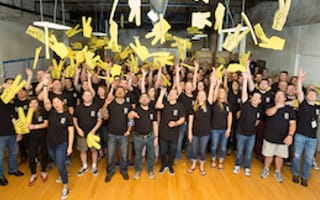
Even if you’ve never heard of John Telford, you’ve probably encountered his work in the wild: Now Executive Solution Director at Bounteous, one of his first jobs at the company was overseeing the development of the Domino’s pizza tracker.
A former software developer, Telford switched career paths to become a technical project manager in order to have a bigger impact on the projects he was working on. In 2010, he received a call from his old employers, Phil Hollyer and Keith Schwartz, about joining their new venture. At the time, Bounteous had 35 employees. Today, that number is closer to 150 — and Telford is responsible for overseeing client success.
We spoke with him about the advantages of technical expertise in project management, the importance of work-life balance and how Bounteous utilizes effective planning to help its employees avoid unnecessary all-nighters.
 What sparked your decision to move from software development to project management?
What sparked your decision to move from software development to project management?
I wanted to find ways to contribute as much as I can. Some project managers are primarily focused on reporting and communication, but in the technology world it’s very helpful to be able to actually sit down with team members to solve problems and make tradeoffs. Every problem we solve and every solution we build weighs competing forces around deadlines, cost and quality. Being a technical project manager allows you to help make those informed decisions taking everything into account.
What are the most interesting trends you’re watching in your industry?
Twenty years ago, when I was still a programmer, personalization was a big thing. But back then, personalization meant saying “Hello, John!” on the homepage. Now, personalization is about getting the right message to the right person at the right time through the right channel. That requires an orchestration of many different software solutions, data warehouses, analytical models, targeting and optimization tools and so on.
There’s probably been more change in this field in the past 36 months than there was in the past 10 years because of things like cloud computing and AI. And I think we will see that continue to expand, because people will expect consistent digital experiences when engaging with their phones and their computers as when they engage with Alexa, Google Home or their cars.
What are some concrete examples of ways in which these changes impact consumer experiences?
Tesla. For many years, the automotive industry was driven by brands rather than features and functionalities. People think Tesla has a big focus on performance and style, but one of the things they don’t realize is that they are really focused on user experience.
Tesla is continually measuring how people use their products. Then they iteratively optimize everything about the car, from the touchscreen UI to actual car performance, while observing how people react to the changes. There’s a lot of other industries where you’ll see companies making changes like that, like healthcare, which is a competitive industry where the user experience has traditionally not been a priority.
What sets the Bounteous team apart from other teams you’ve worked with?
I often tell people that my number one goal is to make Bounteous as successful as possible so I’ll never have to work anywhere else again. We have a great combination of people who are very good at what they do and who really enjoy their work, which creates a very high-energy environment.
Our first core value is putting the customer first, but our second one is to create a healthy work environment, ensuring that people are fulfilled by the work they do and that they have time to spend with their friends and family at home. We don’t have a foosball table or a dusty Rock Band set, because we’re not interested in creating those artificial fun experiences. We get our enjoyment during working hours by doing great work together for great clients.
It’s easy to imagine situations where those two core values conflict with each other. What can you do as a company to prevent that?
Failing to continuously look ahead can cause things to spiral out of control until people are scrambling, putting in all kinds of extra hours that would have been completely avoidable with more planning. We work at eliminating as many of those fire drills as possible, so that when we do have to work past dinner or pull an all-nighter, it’s a real exception and it’s because there’s a real fire.
How do you find the right people for building that kind of culture?
We bring up those values early in the interview process, because if someone isn’t interested in supporting a positive and healthy workplace culture, it’s just not worth their time or ours. But one of the great things about Bounteous is that we get a lot of referrals.
It kind of becomes self-fulfilling when you really focus on hiring the right people for the right reasons and protecting your culture. If you have all the skills in the world but you don’t have people who can work together, you’re never going to get anything done. You can have a team of the most elite people in the world, but a team that can work together well and is focused on a goal will beat them every day of the week.
Images via Bounteous.
What's your startup's story? Let us know with a tip or a tweet @BuiltInChicago




